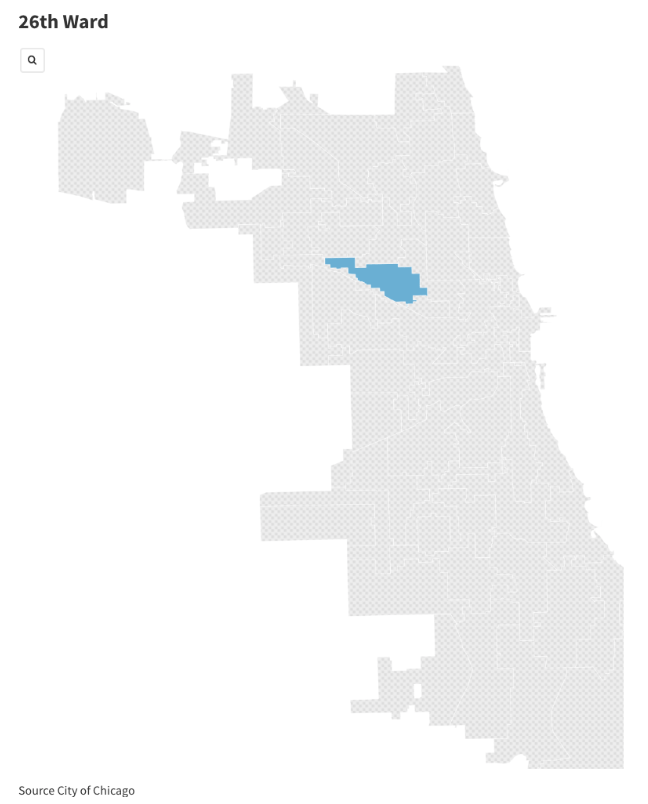The freshman candidate comes in with about a decade’s worth of community work and big name endorsements.
When Jessie Fuentes filed her petitions to be on the ballot for alderperson in the 26th Ward, she walked in with nearly five times the legal requirement to be on the ballot. Two thousand people wrote their signatures for Fuentes, when the minimum requirement was only 473.
Fuentes, who is vying for 26th Ward alder, explained that the reason she was going over the requirement was because it is common for signatures to get challenged and thrown out if they are not accurate.
“Some people just stand outside of a Cermak [grocer],” she said, “and if the signatures don’t match with addresses or names, then they can have their signature removed.”
But Jessie Fuentes did not stand outside of grocery stores, or ‘L’ train stops or any other sure-fire way where she knew she would find large numbers of people. She and her team of volunteers reached out to people the old-fashioned way — walking up to people’s homes and knocking on the door, having a quick chat with the residents and asking if they would consider writing their signature for her petition for alder.

New mapping puts the 26th Ward into Belmont Cragin (Richie Requena, 14 East)
The 26th Ward encompasses largely portions of Humboldt Park, Logan Square, Hermosa and now Belmont Cragin to the west after new ward maps were approved by city council in the spring. The Latine majority ward has been run by 13-year incumbent Ald. Roberto Maldonado since 2009. Maldonado has said he is running for alder again this time, despite rumors he would drop out when he listed his home for sale. This comes among a backdrop that over a fifth of city council will have new representation because 15 alders have resigned their position or refused to run again.
‘It’s not about me.”
Fuentes said running for alderperson in the ward was not a hard choice. “It’s not about me, this race is not about me,” Fuentes said. “This race is about representing every person that looks like me, that comes from the same lived experiences as me, that deserves someone who believes in them. When you make decisions based on that lens, no decision is hard. I mean, the race may be difficult. The work is hard. But the decision comes easy, because it’s not about me.”
The neighborhoods in the 26th Ward have seen, like the rest of the city, an uptick in crime from previous years, and so far neighbors and leaders have disagreed on how to make neighborhoods safer. “The reality is that a lot of families of color are truly concerned about survival, and about being able to make it through the day to day,” Fuentes says. “Restorative justice is a practice that is long term and takes us to our freedom.
“That is why it’s super important that after we get on the ballot, we have to come back to these communities to begin doing the work around consciousness building, because that’s the only way as a district we can move forward.”
Fuentes, 31, is no stranger to restorative justice and how it has impacted her life. She said she had issues coping with her emotions at a young age. She was expelled as a teenager from Carl Schurz High School following a “physical altercation” and then enrolled at Pedro Albizu Campos High School.
“I was born and raised in a community and into a family that suffered from substance abuse, gang involvement. I’m a daughter of an incarcerated parent,” said Fuentes. “When I grew up, I wasn’t given the opportunity to learn the coping mechanisms required to live a healthy lifestyle. And so, I engaged in violent behaviors. I engaged in substance abuse at a very young age of 16, 17, 15 years old. I have a juvenile record and early adult record.”
“But I am also the living example that when you have an organization that invests in you, through programming that invests in you at an educational level — that doesn’t judge you based on your lived experience — or even your physical appearance. I’m a masculine presenting lesbian, that’s a reality. And to be able to have engaged in systems of trauma-informed and healing-centered care is what transformed my trajectory.”
A decade of experience in restorative justice
At 19 years old Fuentes became the director of Batey Urbano, where she organized events that would provide a “safe place” for Black and Latine youth to do the work of gang intervention, drug abuse reduction and violence prevention.
After college, Fuentes went on to become the dean of students at Roberto Clemente for six years, and then the dean of students at Pedro Albizu Campos for four years. She said, “The goal was always how do we transform curriculum and how do we transform disciplinary systems to be affirming of the lived experiences of our young people, to treat them as truly human, to create inviting spaces and not perpetuate the school-to-prison pipeline?”
Dr. Melissa Lewis, principal of Pedro Albizu Campos, said when Fuentes was a dean at her school, “students gravitated towards her and always found her to be someone they can connect to, but also aspire to be.”
When Fuentes was dean of the Pedro Albizu Campos, she was a part of a team that supported students with mental-health resources and framework for restorative justice. Fuentes looks to apply that same method of restorative justice, opening up mental-health clinics, providing health care outside of schools and into the real world with her constituents.
Fuentes became the director of policy at the Puerto Rican Cultural Center two years ago and has also been co-chair of the Puerto Rican Agenda. In those roles she has expanded the violence-prevention department in the Puerto Rican Cultural Center, where she says she has “tackled the root causes” of gun violence. Services in that department include promoting housing sustainability, expunging criminal records, reengaging people into the workforce and the education system, and stabilizing individuals to remove themselves from risky behaviors.
Fuentes said she would not endorse a particular candidate for mayor, because she’s “in the middle of a tough race,” but said she would not back current Mayor Lori Lightfoot. Fuentes said she identifies as being “left” of the Democratic Party.
Fuentes, who supports independence for Puerto Rico, has advocated for federal policy work for the Self Determination bill for Puerto Rico, and helped state senators pass the cultural bill designating Puerto Rico Town in Humboldt Park. Fuentes in those roles has been able to work closely with people who would endorse her run for alder, including Congresswoman-elect Delia Ramirez (D-3rd), Illinois Sen. Cristina Pacione-Zayas (D-20th), Ald. Rossana Rodriguez Sanchez (33rd) and most recently an endorsement from United Working Families.
“[Fuentes] is not doing the work for personal gain,” said Pacione-Zayas. “She’s doing it because she’s a living embodiment of what happens when a community pours into a young person who has been dealt, you know, a deck of cards that are challenging. She has every opportunity afforded to her and she has used it to build up herself and those around her. That is something that in my mind transcends politics.”
Header Illustration by Magda Wilhelm




NO COMMENT